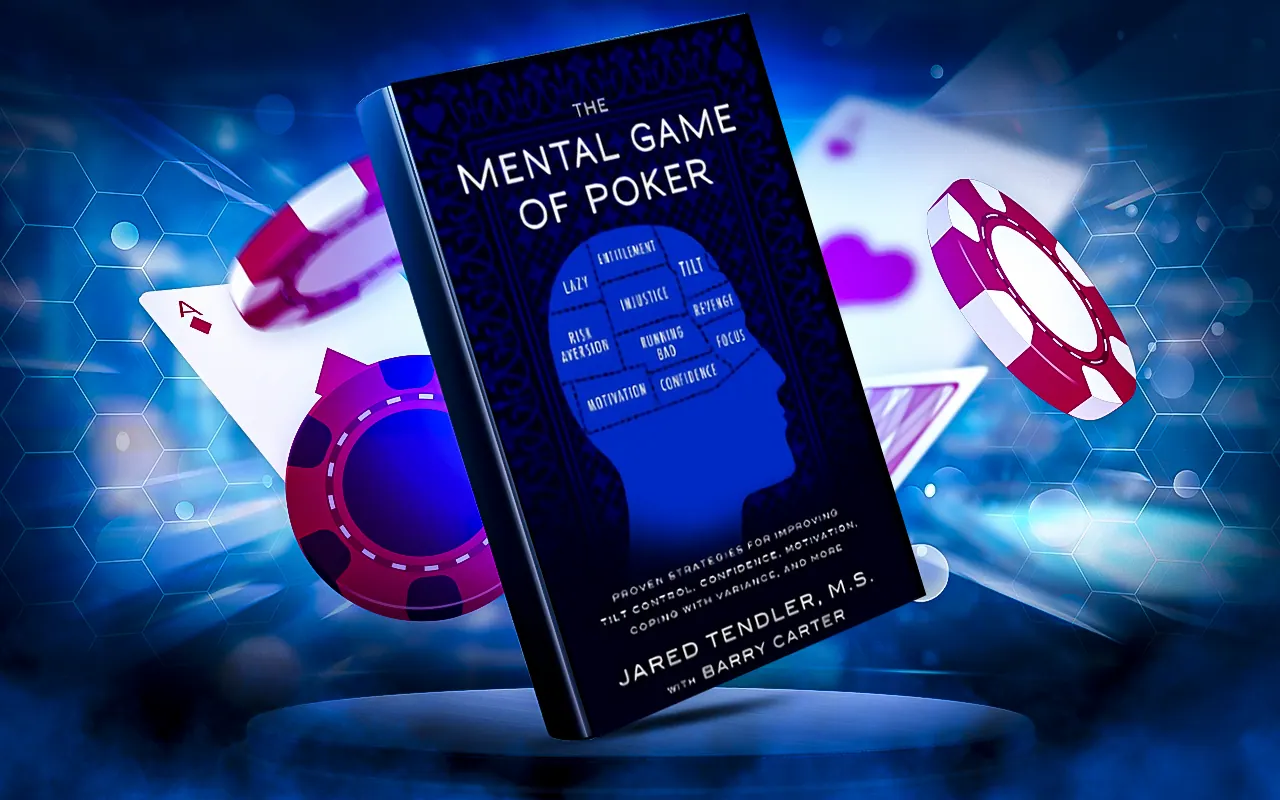In his influential book The Mental Game of Poker, Jared Tendler delves into the often-overlooked psychological aspects that can make or break a player’s success.
 When this book was first released, it was immediately impactful across the full spectrum of poker player skill levels.
When this book was first released, it was immediately impactful across the full spectrum of poker player skill levels.
Boosted, no doubt, by Tendler’s association with online high-stakes legend the late Dusty Schmidt.
Here we will take a look at Tendler’s insights on tilt, emotional control, confidence building, and practical strategies that can help players navigate the intricate mental landscape of poker.
All of the information below has helped countless improving poker players get their heads into the right space.
The Foundation of the Mental Game
Jared Tendler emphasises that mastering the mental game is just as critical, if not more so, than developing technical skills.
Many players can execute optimal strategies yet still face losses due to the inherent variance in poker. This unpredictability often leads to players having a meltdown, ruining their session.
It is essential for players to cultivate a robust mental framework.
Understanding Tilt
Tilt is perhaps the most significant psychological hurdle in poker. Tendler defines tilt as an emotional state that leads to irrational decision-making, often triggered by bad beats, perceived injustices, or personal frustrations unrelated to the game.
Understanding tilt is crucial because it can derail a player’s performance, turning profitable play into heavy losses.
Tendler categorises tilt into a few different types, each with unique triggers and manifestations.
Entitlement Tilt – This occurs when players feel they deserve to win based on their skill level or effort but face unexpected losses. This sense of entitlement can lead to anger and irrational decisions, causing players to chase losses rather than maintain a solid, rational approach.
Defeatism – Players may adopt a mindset where they believe they are simply unlucky or that the cards are against them. This attitude can lead to scared, passive play or a lack of motivation, further exacerbating their situation.
Frustration Tilt – This type of tilt arises from frustration with one’s own play or that of others at the table. Players may become irritated by their opponents’ actions or their own mistakes, leading to impulsive decisions that compound their problems.
By identifying these patterns, players can work on specific strategies to combat them effectively. This is hands down one of the best first mental game steps an improving player can make.
 The Impact of Variance
The Impact of Variance
Variance is an inherent part of poker. Tendler explains that understanding and accepting variance is crucial for maintaining emotional stability.
Players must learn to differentiate between good and bad play based on their decisions rather than outcomes. This shift in perspective helps mitigate feelings of frustration when the inevitable bad runs come along.
Strategies for Accepting Variance
Focus on Decision-Making – Concentrating on making optimal decisions rather than fixating on results allows players to develop a healthier mindset toward variance.
Long-Term Perspective – Learning to prioritise long-term results over short-term outcomes helps to maintain focus and motivation. Keeping track of overall win rates and ignoring individual sessions provides a more accurate picture of performance.
Emotional Detachment – Learning to detach emotions from outcomes is key to managing variance effectively. Techniques such as mindfulness meditation can help cultivate this detachment.
Emotional Control
Emotional regulation is central to Tendler’s teachings. He outlines various techniques for maintaining composure during play, such as mindfulness practices and pre-game routines designed to prepare mentally for the challenges ahead.
By developing emotional control, players can prevent negative feelings from influencing their gameplay.
Techniques for Managing Emotions
Mindfulness Practices – Engaging in mindfulness meditation helps players stay present and focused during games, reducing the likelihood of emotional reactions. Mindfulness encourages awareness of one’s thoughts and feelings without judgment, enabling players to recognise when they are slipping into negative emotional states.
Pre-Game Routines – Establishing a consistent pre-game routine allows players to mentally prepare for their sessions. This routine might include physical warm-ups, reviewing goals for the session, or practicing visualisation techniques.
Post-Session Reflection – After each session, players should take time to reflect on their emotional state during play. Identifying moments when emotions influenced decisions can provide valuable insights for future improvement.

Building Confidence and Motivation
Confidence plays a pivotal role in poker success, and Tendler emphasizes its importance throughout his work. Self-doubt can be just as detrimental as tilt; therefore, building confidence is essential for optimal performance.
Confidence Building Techniques
Positive Affirmations – Using positive self-talk can help reinforce confidence levels before and during play. Affirmations such as “I am a skilled player” or “I make rational decisions” counteract negative thoughts that arise during challenging moments.
Visualization Techniques – Visualisation involves imagining oneself succeeding at the poker table — making strong plays, winning pots, and handling difficult situations with poise. This mental rehearsal prepares players for real-life scenarios and boosts confidence levels.
Celebrating Small Wins – Acknowledging and celebrating small victories — whether it’s making a good fold or successfully executing a bluff — can help reinforce confidence over time.
Motivation Strategies
To combat motivational slumps, Tendler suggests setting clear goals and breaking them down into manageable tasks:
Goal Setting – Players should establish both short-term and long-term goals related to their poker journey. Short-term goals might include improving specific skills or maintaining emotional control during sessions, while long-term goals could involve achieving a particular win rate over time.
Task Breakdown – Breaking larger goals into smaller tasks makes them more achievable and less overwhelming. For example, if a player aims to improve tournament pre-flop performance, they might focus on studying specific strategies each week rather than trying to overhaul their entire game at once.
Accountability Partners – Finding a fellow player or coach who can provide accountability encourages motivation and commitment toward achieving set goals.
 Practical Applications
Practical Applications
Throughout The Mental Game of Poker Tendler shares stories from professional players who have successfully implemented his techniques.
These case studies illustrate how addressing mental game issues has led to significant improvements in performance:
Real-Life Success Stories – Players report feeling more in control during sessions after applying Tendler’s methods, leading to better decision-making under pressure.
For instance, one player noted that after recognising his tilt triggers and employing mindfulness techniques, he experienced fewer emotional breakdowns during high-stakes games.
Reduced Tilt Incidents – Many have noted a reduction in tilt-related incidents after identifying specific triggers and developing personalised strategies to address them effectively.
Enhanced Focus and Performance – By practicing emotional regulation techniques and focusing on decision making rather than outcomes, several players have reported improved overall performance at the tables.

The Role of Coaching
Tendler also emphasises the importance of seeking external support through coaching or mentorship:
Finding a Coach – A decent coach will provide valuable feedback on both technical skills and mental game issues while offering an outside perspective that helps identify areas needing improvement.
Peer Support – Engaging with fellow players who share similar goals creates an environment conducive to growth and learning from one another’s experiences.
Continuous Learning – The poker landscape is always evolving; and so continuous learning through books, videos, forums, or private coaching keeps players sharp both technically and mentally.
Jared Tendler’s The Mental Game of Poker offers invaluable insights into the psychological challenges faced by poker players at all levels.
By emphasising the importance of understanding and managing tilt, handling variance effectively, cultivating emotional control, building confidence, and maintaining motivation through structured goal-setting strategies, Tendler provides a comprehensive framework for improving your mental game.
For serious poker players looking to enhance their performance, this is a subject that extends beyond the works of Jared Tendler. However, many players testify that the double volume is essential for long-term success at the tables.
Mastering the mental game allows players to navigate the complexities of poker with greater resilience and effectiveness while fostering an environment where they can thrive amidst both victories and defeats.
While technical skills are crucial for success in poker, it is often the mental game that separates good players from great ones.
By embracing these psychological elements, players can enhance their overall performance while enjoying a deeper appreciation for this intricate game of skill and strategy.
- Get the best rakeback deals
- See the best poker promotions
- View the latest poker news
- Get the best No Deposit Poker Bonuses
- Benefit from the biggest poker bonus
- Calculate your rakeback with the rakeback calculator
Terms and conditions apply. New customer offer and 18+ only. Should you require help regarding your betting pattern, please visit www.begambleaware.org


 The Impact of Variance
The Impact of Variance Practical Applications
Practical Applications



















